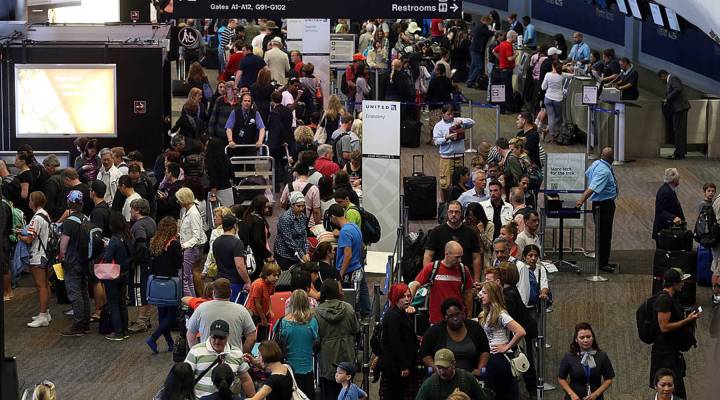
Biometric screening is coming to the airport of the future
Biometric screening is coming to the airport of the future

The trek through security at the airport is no picnic. Long lines for check-in and bag drop, security screenings, multiple ID checks — it makes for a tedious, often drawn out experience. So it may come as no surprise that airlines are trying to cut back on wait times with biometrics. JetBlue is experimenting with facial recognition scanning to expedite boarding. Delta invested $600,000 in four fingerprint scanners to create a self-service bag drop.
Biometrics are, for many Americans, standard and familiar. We use them to log into our phones and access our banking information. Those people who have enrolled in TSA PreCheck, CLEAR or Global Entry have already handed over extra personal information so as to speed along the security screening process at the airport.
Airlines and airports are exploring the idea of biometric screening as a way to ease the check-in and boarding process for all travelers. Here’s your guide to how it works:
What happens when I get to the airport?
Right now, unless you’re at London Heathrow, where British Airways is trying this out, or one of the two U.S. airports (Boston or Atlanta) where JetBlue and Delta are piloting their respective programs, nothing! But the idea is, once the programs expand, you’ll move through security using your face as your boarding pass. Instead of whipping out your drivers license at check-in, bag drop, and security, you’ll use a face scan or your fingerprints — which will serve as boarding pass and ID. You’ll scan while checking-in, scan while leaving your bag at a self-service drop spot and scan again before heading through the metal detectors and boarding the plane.
How does that change things?
The idea behind the push to use biometrics is that it will make going through security faster and simpler. That means fewer employees working the floor at the airport, less of a wait for check-in and more time eating, shopping and spending money inside the airport (at least, the airport and airlines hope that’s what it means). It’s important to note that biometric screening is 100 percent optional — you don’t have to sign up, and if you’d rather just keep pulling out your boarding pass and ID, there will be someone around to check you in the old-fashioned way.
Okay, but what are the potential problems using biometrics at the airport?
One big issue is vulnerability. When you use your fingerprint or face scan to unlock your phone, for example, that data is stored only on your phone. There’s no database offsite, waiting for a big hack. When a business (or government) stores large collections of sensitive data, that data becomes more vulnerable to hacking. Speaking of the government, the Department of Homeland Security has proposed expanding its biometric program used to track non-immigrant foreigners entering the U.S., to include U.S. citizens. If the proposed expansion goes into effect, U.S. citizens will have their faces scanned at the airport when they travel abroad.
Another big issue could be machine breakdowns. Sure, the scanners work now, but after hundreds of thousands of fingerprints push down on the screens, there’s bound to be some breakage (and a resulting long line).
Do people want to use biometrics?
According to a recent survey from air transport tech company SITA, 57 percent of passengers would prefer a biometric check-in process.
So, would you try it? Tell us about your thoughts and questions about biometric screening at the airport. Write to us at weekend@marketplace.org, hit us up on Facebook or tweet at us. We’re @MarketplaceWKND.
There’s a lot happening in the world. Through it all, Marketplace is here for you.
You rely on Marketplace to break down the world’s events and tell you how it affects you in a fact-based, approachable way. We rely on your financial support to keep making that possible.
Your donation today powers the independent journalism that you rely on. For just $5/month, you can help sustain Marketplace so we can keep reporting on the things that matter to you.












